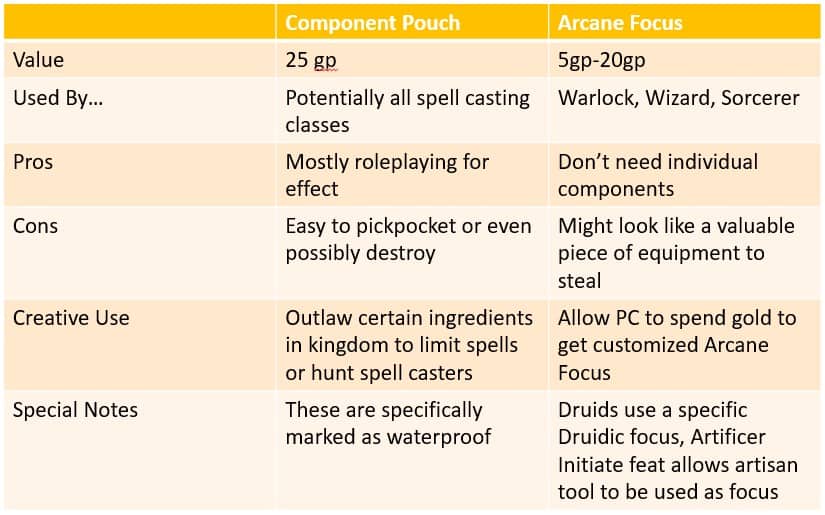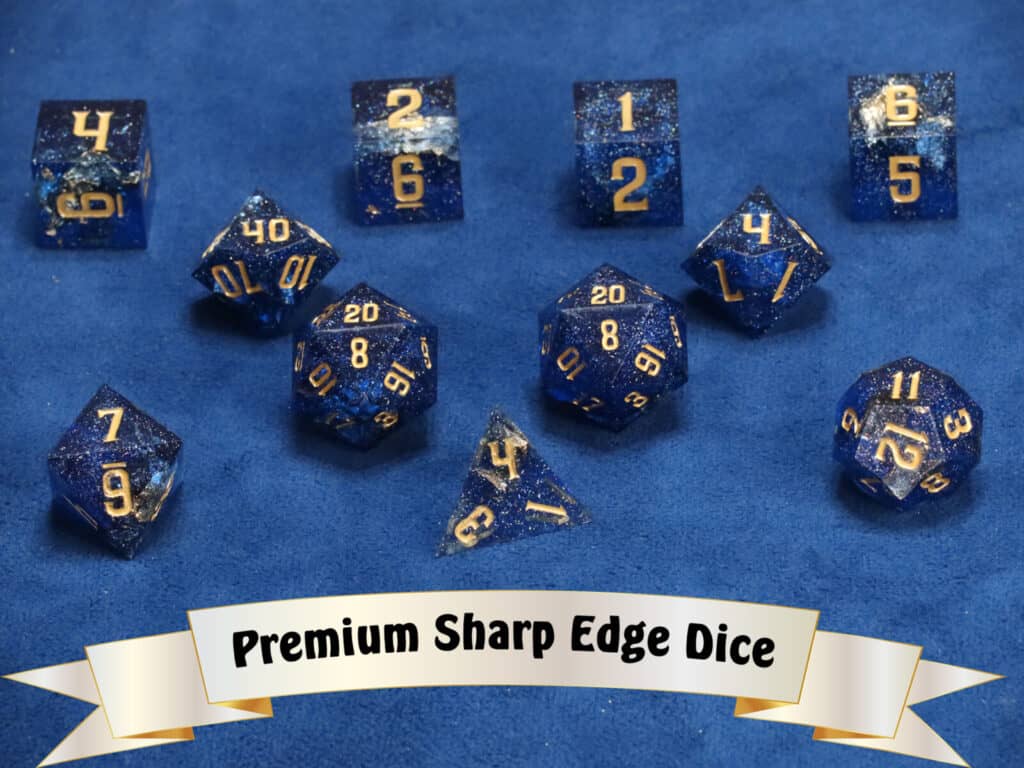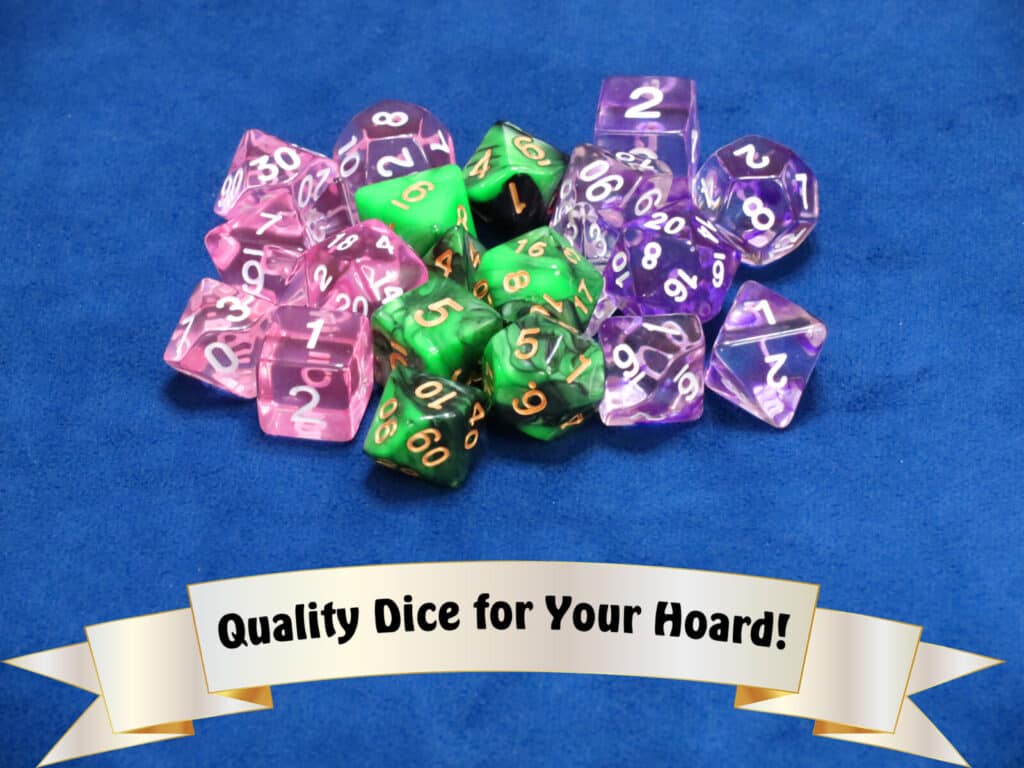One thing I really love about 5th Edition Dungeons & Dragons is the number of details tucked away throughout the multiple released books. What I mean by this is while the system is generally very open and malleable, there are many details that can radically change the tone of a specific campaign or simply be ignored as unimportant details for another.
Looking at component pouches, arcane focuses, and the differences between the two is a classic example.
A component pouch is a waterproof pouch that can be used by all casters to holding spell ingredients. An arcane focus is an item either from the PHB or approved by your DM that replaces the component pouch for ingredient-free casting. One or the other is necessary for a spell caster to use magic.
Understanding Component Pouch vs. Arcane Focus in 5E

The Player’s Handbook (PHB) explains how spells work pretty well, and between chapter 4 and chapter 10 you get everything you need to know about how spellcasting works. For those spells that require actual ingredients, both the component pouch and arcane focus are described in detail on page 151.
Component Pouch: An actual waterproof pouch of spellcasting ingredients. Can be used by any spell casting class, and the default item used unless an arcane focus is an option.
Arcane Focus: An item that can be used by sorcerers, warlocks, or wizards to focus their magic power in lieu of the components.
The component pouch can be used by any casting class, while the three traditional casting classes are the only ones that can replace the pouch with an arcane focus. Unless, of course, your DM house rules that, as well (this can also be a creative way to create useful, original, and non-boring loot for certain party members in the right campaign).

Why Does This Matter?
In most basic 5E campaigns this doesn’t matter. Most of the time in my experience a DM just sort of ignores these. At our games we pretty much use the D&D home rule of you have the components as long as they don’t cost money. If they do, just deduct the gold pieces when you cast the spell. If you have enough gold, you’re good.
In those cases, the difference between the two is really non-existent for all intents and purposes. And at many 5E DnD tables this may very much be the case.
This isn’t necessarily a bad thing. If those types of details don’t matter in the campaign that’s being run, why get bogged down in them? On the other hand if you are running a survival campaign (like THIS one Zee Bradshaw describes) that really focuses on details and creates the feeling of constant struggle and fighting for survival, then these become a really big deal.
In those types of campaigns, the difference between a component pouch and an arcane focus really does does matter since scavenging for ingredients becomes a very big deal at that point.
In most campaigns, it really doesn’t matter since these are details most DMs don’t bother with – if they’re even aware of these possible casting limitations.

Situations Where a Component Pouch Matters
If a component pouch is usually an afterthought, when could a component pouch matter in play? This brought forward a few thoughts. These might be situations that come up in a campaign or they might not, but they’re worth looking at as both player or DM to
Are your hands tied up?
In a very detail oriented campaign you can still cast with an arcane focus. That just has to be on your person. However, if your escape plan involved a fireball and you can’t reach your bat guano and sulfur then…well good luck.
City Guards: 1 Adventuring Party: 0
Are any components rare?
Is mistletoe nearly extinct? Are there no shops so you actually need to find bats in a cave or a certain type of plant? Have the local rangers set up an ingredient racket that magic users need to tolerate until they can find a rare arcane focus?
These are interesting potential situations that could potentially come up in a very detail oriented campaign. This won’t be right for every party or campaign but it can definitely change how a component pouch comes into play in this world.
How good is an opposing rogue?
You reach for an ingredient…and it’s gone? Suddenly those tense negotiations are even more tense as the opposing rogue drops a bag of stolen components at his or her feet. They might not be able to pull the pouch off your person, but they were smart enough to lift important ingredients off of you as things started going sideways.
That’s a lot of information which can build to multiple situations, conversations, or implications for that scene of a D&D session.
Did you take an acid bath?
The PHB is very specific that the pouch is waterproof. But acid isn’t water. For a particularly nasty or vengeful DM, this could be an opportunity. Did the acid hit just you or also your ingredient pouch?
Introduce the five words that I taught my table to fear: Give me a luck roll.
PCs can see what you’re doing.
This can really change a situation if someone is trying to cast on the down low. Silent casting from a sorcerer is great and prevents a verbal counter spell. But if an overzealous bard who took fireball from his College of Lore boon is opening a pouch and pulling out bat guano…well the PCs are almost certainly going to notice those actions.
Any of them that pass an Arcana check might choose to immediately at, thrusting the group into a surprise round.

Situations Where an Arcane Focus Matters
While this is a detail that doesn’t matter a lot, and isn’t available to bards, clerics, and other non-big three casters (sorry guys), in any game where this matters the casters will prefer an arcane focus. In our campaigns many players choose to meld their focus with a weapon or piece of armor/clothing so it’s always on them.
What if the arcane focus is stolen?
This could make an arcane focus very important. If it’s stolen or somehow confiscated, suddenly those ingredient lists on your spells matter, especially when looking at prepared spells you suddenly don’t have the ingredients to cast.
Are they a clear upgrade over a pouch?
In a world full of street urchins, thieves, and rogues, a lot of hands can end up in your ingredient pouches. Unless you want to roll a lot of perception checks and luck rolls to make sure you can always cast the spells you want, it’s time for an arcane focus that can’t be lifted off of you.
Outlawed magic, outlawed ingredients
What about an area, a world, a low magic campaign where magic is outlawed? Where the ingredients are widely known and thus treated like cocaine, PCP, or other illegal substances?
In these situations getting an arcane focus could actually be considered a serious reward, or a high value black market item because of all these components are considered illegal like narcotic drugs.
Home Brew Option: Have an Arcane Focus for a non-focus class as a potential reward for a risky mission.
An item that potentially powerful in a campaign where details like this matter could encourage some risk taking for a bard who is tired of the component pouch coming up missing or the paladin who would prefer a symbol of their god on their shield to be the focus. There are plenty of options available to creatively make a homebrew arcane focus matter without introducing some original magic item that has unintended power creep.

Common 5E Arcane Focus Questions
Can I use a custom item for an arcane focus, or do I need to use one of the options found in the 5E Player’s Handbook?
As written in the rule books casters who can use an arcane focus can choose from crystal, orb, rod, staff, or wand. Artificers use one of their tools as a focus, as do players with the artificer initiate feat. This gives precedence for having homebrewed or custom items as an arcane focus, but that is DM preference.
Is a component pouch or arcane focus better in 5E Dungeons & Dragons?
From a mechanical point of view there’s technically no difference between an arcane focus and a component pouch. From a flavor point of view, depending on your DM there are arguments to be made that the arcane focus is better. Though keep in mind only some classes can use an arcane focus while all can use component pouches.
How much does an arcane focus cost?
According to the Player’s Handbook, the price of an arcane focus varies based on the type. The cheapest is a staff at 5 gp, the most expensive is an orb at 20 gp, and 10 gp for all the others.
What is a Druidic focus and how much does it cost?
The Druidic focus is the specific type of focus that a Druid needs to cast spells. The PHB gives examples of a spring of mistletoe, totem, wooden staff, or yew wand.
Can you have more than one arcane focus?
Yes. There’s no reason to be using more than one at a time, but having a backup arcane focus is like having a backup spell book: it’s just a good idea for casters. Especially with a detail oriented DM.
Can a ring be an arcane focus?
There’s nothing prohibiting it via the handbook, but there’s no section about homebrewing it. However, the DM can absolutely decide that a special ring can also work as an arcane focus if they see fit.
Can an arcane focus be destroyed?
Yes. Magical items can technically be destroyed by mundane means. An arcane focus isn’t even that, so a focus could be destroyed.
Common 5E Component Pouch Questions
Can an arcane focus replace a component pouch?
An arcane focus does replace a component pouch for casting purposes in 5E DnD.
How much does a component pouch cost?
Most casters start with a component pouch, but there are many reasons you man need a new one in the future and the price is 25 gold according to the Player’s Handbook.
Can bards use an arcane focus or do bards use a component pouch?
Bards can not use an arcane focus. Unless the DM offers a homebrewed solution they must use a component pouch.
Do I need to separate my ingredients in a component pouch?
There’s no reason to “separate” ingredients in a component pouch. The assumption is that component pouches are arranged so ingredients are easy to grab – there’s never a reason to roll a check to find the right ingredient or anything like that.
So 5E Arcane Focus Vs. Component Pouch: Which Should You Choose?
In most campaigns these are generally background details. Because of that, most of the time this doesn’t frankly matter. However, if you find yourself in any of the earlier examples or with a DM who looks over every single detail then you need to look over the pros and cons outlined in this post and make a decision from there.
At least you know the difference now to make an educated choice as the wizard, sorcerer, or local warlock of the group!

Other DnD Articles You May Enjoy
- Skilled Feat 5E Guide
- Sorcerer Vs Wizard 5E
- Perception Vs Investigation 5E
- Best Underrated Utility Spells 5E
- How Does Disarm Work 5E
- Best Feats for Sorcerers
- Best Feats for Wizards

Proud to embrace the locally created moniker of “Corrupt Overlord” from one of the all time great Lords of Waterdeep runs, Shane is one member of the Assorted Meeples crew and will be hard at work creating awesome content for the website. He is a long-time player of board games, one time semi-professional poker player, and tends to run to the quirky or RPG side of things when it comes to playing video games. He loves tabletop roleplaying systems like Dungeons & Dragons, Pathfinder, Werewolf, Fate, and others, and not only has been a player but has run games as DM for years. You can find his other work in publications like Level Skip or Hobby Lark.
